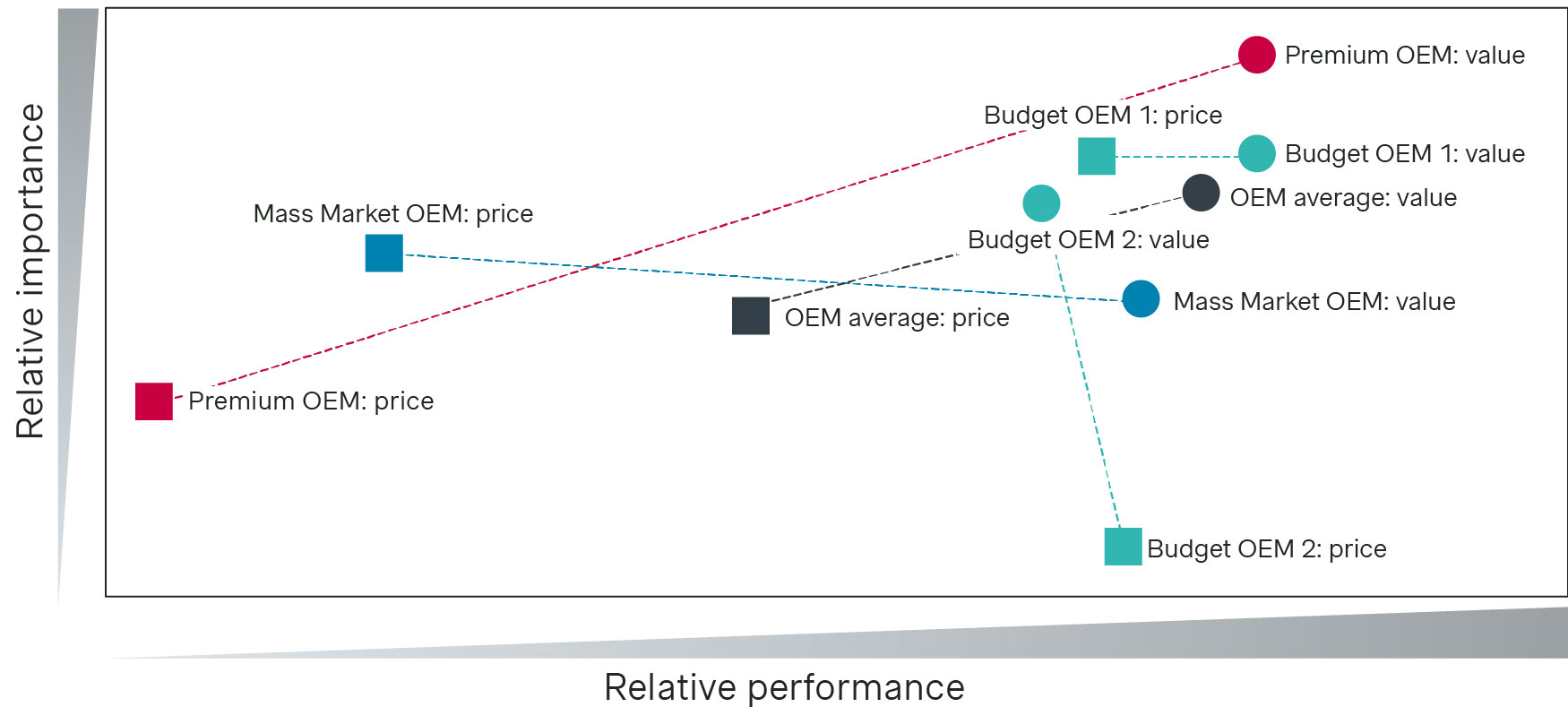About this series Simon-Kucher’s Fleet Growth Playbook is a five-part series that explores the commercial strategies reshaping the future of the automotive fleet ecosystem. From OEMs and leasing providers to mobility platforms and service networks, the series examines how players can stay competitive as electrification, digitalization, and cost pressures accelerate change. Each article in this series draws on insights from Simon-Kucher’s Fleet Study 2025 and examines a distinct commercial lever. This fifth and final installment focuses on value-based selling: why relying on total cost of ownership (TCO) is no longer enough, and how fleet providers can shift the sales conversation to highlight total value delivered, from sustainability and uptime to risk management and customer outcomes. |
Why “lowest total cost” is no longer the best way to win fleet business
Total cost of ownership (TCO) has long been the currency of fleet decision-making. For decades, B2B customers focused squarely on upfront price, depreciation, fuel costs, and servicing when evaluating vehicles and providers. Price won, and everything else followed.
But that equation is breaking down.
Today’s fleet buyers are juggling far more than cost alone. Sustainability mandates, digital transformation, operational uptime, driver satisfaction, and risk management are now central to procurement decisions. And the most successful fleet providers are the ones who go beyond TCO to sell on total value delivered.
While price remains a key factor in fleet sourcing, Simon-Kucher’s Fleet Study 2025 reveals that premium OEMs are successfully shifting the conversation. By delivering superior service, reliability, and innovation, they justify significant price premiums and secure strong positions in fleet portfolios.
In contrast, mainstream brands must strike a careful balance, combining competitive pricing with credible service quality to stay in the mix. Notably, fleet managers rank value-oriented features, such as uptime and support, above purely price-driven attributes on average, highlighting the importance of a broader value proposition.
Importance and performance of price vs. non-price features in OEM selection (top 4 mentioned OEMs in fleet composition)

Simon-Kucher Fleet Study 2025 (n=170)
The limits of traditional cost-based selling
Selling on TCO makes sense in stable, homogenous markets. But given the demands of today’s fleet market, this approach can create risk:
It drives commoditization, reducing differentiation to a price war.
It overlooks strategic value, such as emissions reduction, safety technology, or operational support.
It fails to resonate with broader stakeholder needs, including ESG, HR, or finance teams.
EVs and mobility solutions often face headwinds in traditional TCO comparisons, particularly in the early years when acquisition and infrastructure costs are higher. Yet these offerings frequently unlock substantial long-term and strategic value, from regulatory compliance and brand positioning to improved employee engagement. Our fleet study reinforces this shift: 76% of fleet managers cite sustainability and carbon reduction as key sourcing criteria that go beyond total cost considerations.
Importance of ESG related purchase driver

Simon-Kucher Fleet Study 2025 (n=170)
To unlock growth and defend margins, fleet providers need a new playbook: value-based selling.
What value-based selling looks like in fleet sales
Moving beyond TCO doesn’t mean abandoning cost transparency. It means reframing the conversation to highlight outcomes that matter.
Here’s how high-performing sales teams are doing it:
Demonstrating productivity gains, e.g., using telematics data to prove faster route completion, fewer breakdowns, or improved fuel efficiency.
Quantifying risk mitigation, e.g., driver safety systems, automated maintenance alerts, or uptime guarantees.
Linking fleet decisions to ESG goals, e.g., carbon savings, alignment with carbon reporting frameworks, or eligibility for green incentives.
Offering outcome-based contracts with service levels or pricing tied to KPIs like uptime, energy usage, or delivery performance.
For example, a logistics company might be hesitant to adopt EVs due to higher leasing costs. But a value-based approach could highlight how lower maintenance, emissions compliance, and home-charging infrastructure reduce long-term risk and improve employee satisfaction. The pitch moves from “price per month” to “value per kilometer”.
Enabling the value conversation
Shifting from price to value takes more than new messaging. it requires enabling your sales force to confidently own the conversation. This means equipping them with:
Segment-specific business cases that address top customer KPIs (e.g., delivery uptime, carbon reporting, driver churn).
ROI calculators that quantify value in monetary terms, turning abstract benefits into tangible impact.
Value cards and pitch playbooks to guide structured, consultative selling.
Training on objection handling, especially for justifying premium pricing with confidence.
Value-based selling also requires better collaboration across product, sales, and marketing. Everyone must understand the economic and strategic levers your solutions unlock – and how to present them clearly.
Common pitfalls to avoid
Even well-intentioned value-selling programs can fall short. Watch out for:
Overcomplicated tools that sales teams won’t use.
Generic value messaging that doesn’t resonate with specific customer roles or industries.
Weak follow-through, e.g., when premium solutions are sold without the service support to deliver promised outcomes.
Lack of alignment with pricing. If your pricing model doesn’t reflect value delivered (e.g., no outcome-based options), credibility suffers.
The key is consistency. Customers must experience the value throughout the buying journey, not just hear about it at pitch time.
How Simon-Kucher helps fleet providers move beyond TCO
At Simon-Kucher, we support fleet players in building commercial strategies that sell on value, not just cost.
We help you:
Identify and quantify customer-perceived value across segments and use cases.
Build ROI tools, value calculators, and proof points to empower sales conversations.
Design pricing models aligned to value metrics, including performance-based and subscription structures.
Develop sales enablement assets and training programs to increase salesforce confidence and conversion.
Align marketing and product around a clear, value-led narrative that supports differentiation and premium positioning.
The result? Stronger customer engagement, improved monetization potential, and more sustainable growth.
Value beats cost, when you sell it well
Competing on cost alone is no longer enough. Customers are looking for partners who understand their business challenges, align with their strategic goals, and deliver measurable outcomes. Value-based selling empowers fleet providers to make that case: clearly, credibly, and commercially.
Ready to move beyond TCO?
Contact Simon-Kucher to unlock pricing power and customer loyalty, selling the full value your fleet solutions deliver.




